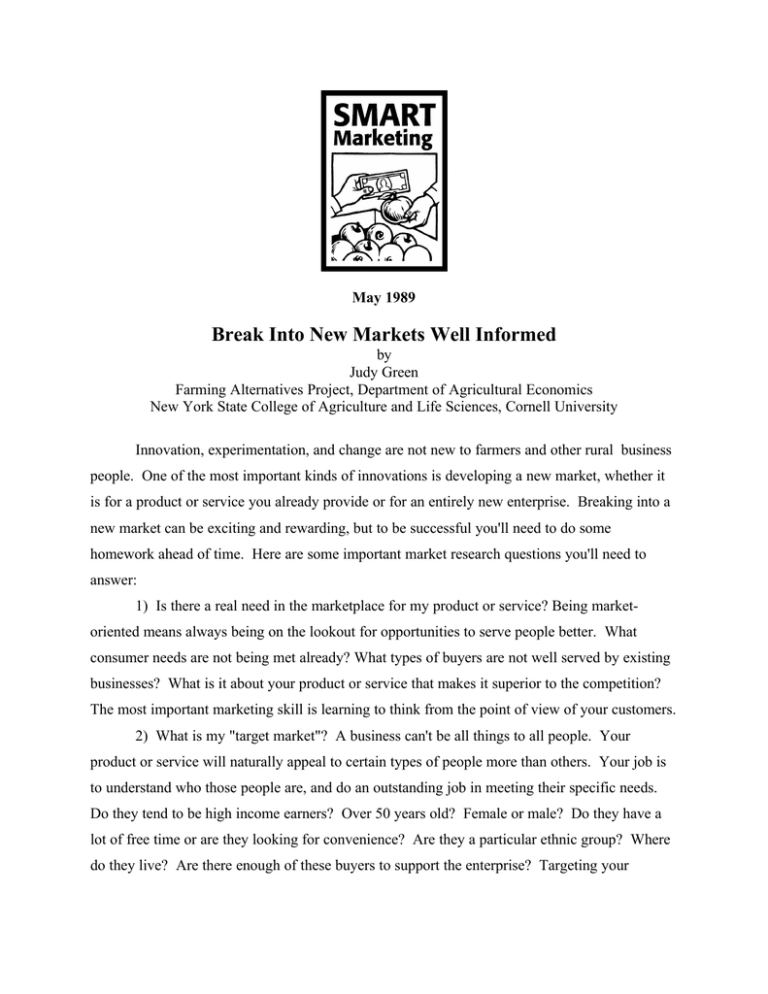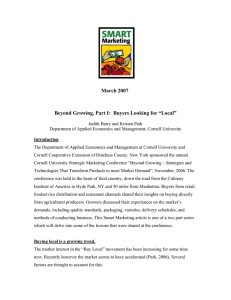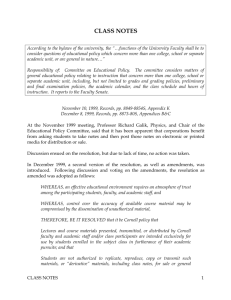Break Into New Markets Well Informed
advertisement

May 1989 Break Into New Markets Well Informed by Judy Green Farming Alternatives Project, Department of Agricultural Economics New York State College of Agriculture and Life Sciences, Cornell University Innovation, experimentation, and change are not new to farmers and other rural business people. One of the most important kinds of innovations is developing a new market, whether it is for a product or service you already provide or for an entirely new enterprise. Breaking into a new market can be exciting and rewarding, but to be successful you'll need to do some homework ahead of time. Here are some important market research questions you'll need to answer: 1) Is there a real need in the marketplace for my product or service? Being marketoriented means always being on the lookout for opportunities to serve people better. What consumer needs are not being met already? What types of buyers are not well served by existing businesses? What is it about your product or service that makes it superior to the competition? The most important marketing skill is learning to think from the point of view of your customers. 2) What is my "target market"? A business can't be all things to all people. Your product or service will naturally appeal to certain types of people more than others. Your job is to understand who those people are, and do an outstanding job in meeting their specific needs. Do they tend to be high income earners? Over 50 years old? Female or male? Do they have a lot of free time or are they looking for convenience? Are they a particular ethnic group? Where do they live? Are there enough of these buyers to support the enterprise? Targeting your marketing efforts toward likely buyers will be much more effective than using a shotgun approach. 3) What's my competition? Many producers are wary of "saturating the market," and rightly so. Doing the same old things that your competitors are already doing well is probably a recipe for failure. Instead, study your competition very carefully and look for their strengths and weaknesses. What businesses are already out there doing what you propose to do, or something like it? What kind of quality and service do they offer? What prices? What kind of customer do they attract, and how well satisfied are these customers? Again, think of your specific target market, and find ways to outdo the competition in meeting their specific needs. Other important questions need to be considered before undertaking a new marketing strategy. Is it consistent with your family goals and farm business goals? For example, starting up an on-farm market will have a tremendous impact on all family members. They need to be involved in evaluating the idea. Do you have the resources and experience to break into this new market? Getting a new product onto the supermarket shelves can be tremendously expensive, whereas setting up a booth at the local farmers market doesn't require much of an investment. Will this new market by profitable? You need to project potential sales and prices received, and weigh these against the costs of producing and marketing your product. Of course, unless you are able to hire a consultant, you will have to do most of the marketing homework yourself. But good market research does not require an expert, and it doesn't have to be expensive. Make sure your efforts are targeted and cost-effective. With some planning, some assistance, and some hard work, do-it-yourself market research will pay off in improving the odds for your new marketing strategy. And it is a skill that you will use over and over as your business grows into the future. For more information on developing a new rural enterprise, you may want to get a copy of "Farming Alternatives: A Guide to Evaluating the Feasibility of New Farm-Based Enterprises." Contact your county office of Cornell Cooperative Extension or order direct from NRAES, 152 Riley-Robb Hall, Cornell University, Ithaca, NY 14853.











